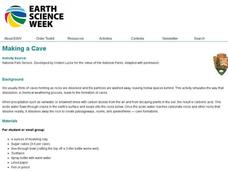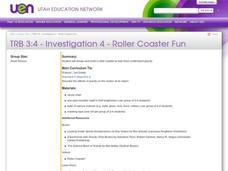Curated OER
Plants And Pollination
Students describe sexual reproduction in plants, including the process of pollination, how insects assist in pollination, and how pollination differs from fertilization. They also explore the importance of honey bees to Arizona agriculture.
Curated OER
Donde en el mundo estas?
Students give & follow directions given in Spanish, using oral, written and graphics. They use maps, globes, atlases, and remote sensing, GIS, and GPS to acquire and process information about places.
Curated OER
A Bit of Engineering
Students discuss the drilling process. In this engineering lesson, students get into small groups and drill their own core samples in a sandwich using a plastic tubing, a jumbo straw, a slim straw and a offee stirrer predicting which...
Curated OER
Making a Cave
Students discuss caves. In this science instructional activity, students experiment with how dissolution, a chemical weathering process, leads to the formation of caves. Once the cave is finsihed students draw a picture or describe in...
Curated OER
Predicting the Future
Students examine how scientists predict the effects of global climate change. In this environmental science lesson, students participate in a discussion about using computer generated data to create climate predictions. Students examine...
Curated OER
Roller Coaster Fun
Third graders review the effects of gravity on how objects move. In groups, they design a roller coaster and share it with their classmates. Using materials given to them, they build their roller coaster and let a ball roll on the...
Curated OER
The Environment and You
First graders examine the human environmental impact and discover ways to lessen effects. They create a pollution damage flow chart and write down what they think Mother Earth might say. They create inventions from recyclable materials.
Curated OER
It's All Part of the Story
Students explore storytelling through pantomime, improvisation, and dramatization. They watch an online video, discuss Native American earth stories, role-play various situations, explore websites, and present an oral story to the class.
Curated OER
Science Lessons for Grade 11
Young scholars explore different activities in biology, physics and chemistry. In this science lesson, students examine chromosomes using a microscope and explain their significance in sustaining life on Earth. They investigate alkanes...
Curated OER
The Water Cycle: Revising the Drafts
Students explore states of matter by concentrating on the ways in which water moves between its solid, liquid, and gaseous states in a variety of Earth environments familiar to the students. Students represent these movements in dance.
Curated OER
Science: Discovering Sharks
Students incorporate some basic information regarding ocean life and ecological conservation into their "earth watch" lives.
Curated OER
Rock Cycle Activity
A few of the components of this lesson are not possible to carry out because the rock cycle diagram and challenge handouts are not included. Hopefully, you already have your own rock cycle diagram or worksheet to use as a concept...
Curated OER
Water Magic
Students conduct experiments with ice, water and steam to observe the water cycle. They discuss substances that water accumulates from the Earth as it moves through its cycle.
Curated OER
Erosion
Fifth graders study what erosion is, what causes it, and ways to slow its progress. They complete an experiment that depicts soil moving down a slope as water is poured on it to show how moving water erodes land. Next, they observe...
Curated OER
My Three Wishes
Pupils write/type a three wish paragraph into Microsoft Word. They include specific items and ideas, that are listed in this lesson plan, in their paragraph. They participate in printing their paragraphs and sharing them with the class.
National Park Service
Reduce Our Carbon Footprint, Let’s Compost!
Roll up your sleeves and get a little dirty with this elementary and middle school compost lesson. All you need is a large plastic container, a couple old newspapers, some organic waste, and a few hundred worms and you're ready to start...
Cornell University
Constructing and Visualizing Topographic Profiles
Militaries throughout history have used topography information to plan strategies, yet many pupils today don't understand it. Scholars use Legos and a contour gauge to understand how to construct and visualize topographic profiles. This...
Science Friday
Capturing Carbon Dioxide
Why don't we just capture carbon dioxide in the air and store it somewhere else? A hands-on instructional activity allows scholars to explore a complex concept. First, they will create a carbonated beverage, and then they will determine...
Chicago Botanic Garden
Introducing Ecosystem Services
Ecosystems provide many things humans not only use but also need in order to survive. The last instructional activity in the series of seven introduces scholars to the idea of ecosystem services, that ecosystems provide humans with many...
NOAA
Currents
Learn how ocean currents are vital to humans and marine life. The eighth installment of a 23-part NOAA Enrichment in Marine sciences and Oceanography (NEMO) program, focuses on ocean currents and how they affect global climate. The...
EduGAINs
Go H2O! Investigating Residential Water Systems
Before your learners excuse themselves to get a drink at the water fountain, prompt them to think about where that water comes from. A middle school science lesson encourages groups to research their community's source of drinking water,...
University of Colorado
Can Photosynthesis Occur at Saturn?
In the 19th activity of 22, learners determine if distance from a light source affects photosynthesis. Participants capture oxygen in straws and find that the amount of water the gas displaces is proportional to the rate of photosynthesis.
Chicago Botanic Garden
The Carbon Cycle
There is 30 percent more carbon in the atmosphere today than there was 150 years ago. The first lesson plan in the four-part series teaches classes about the carbon cycle. Over two to three days, classes make a model of the cycle, add...
NOAA
Journey to the Unknown
What's it like to be a deep-sea explorer? Tap into the imaginations of your fifth and sixth graders with a vivid lesson, the second part of a six-part adventure. Learners close their eyes and submerge themselves in an expedition aboard...

























